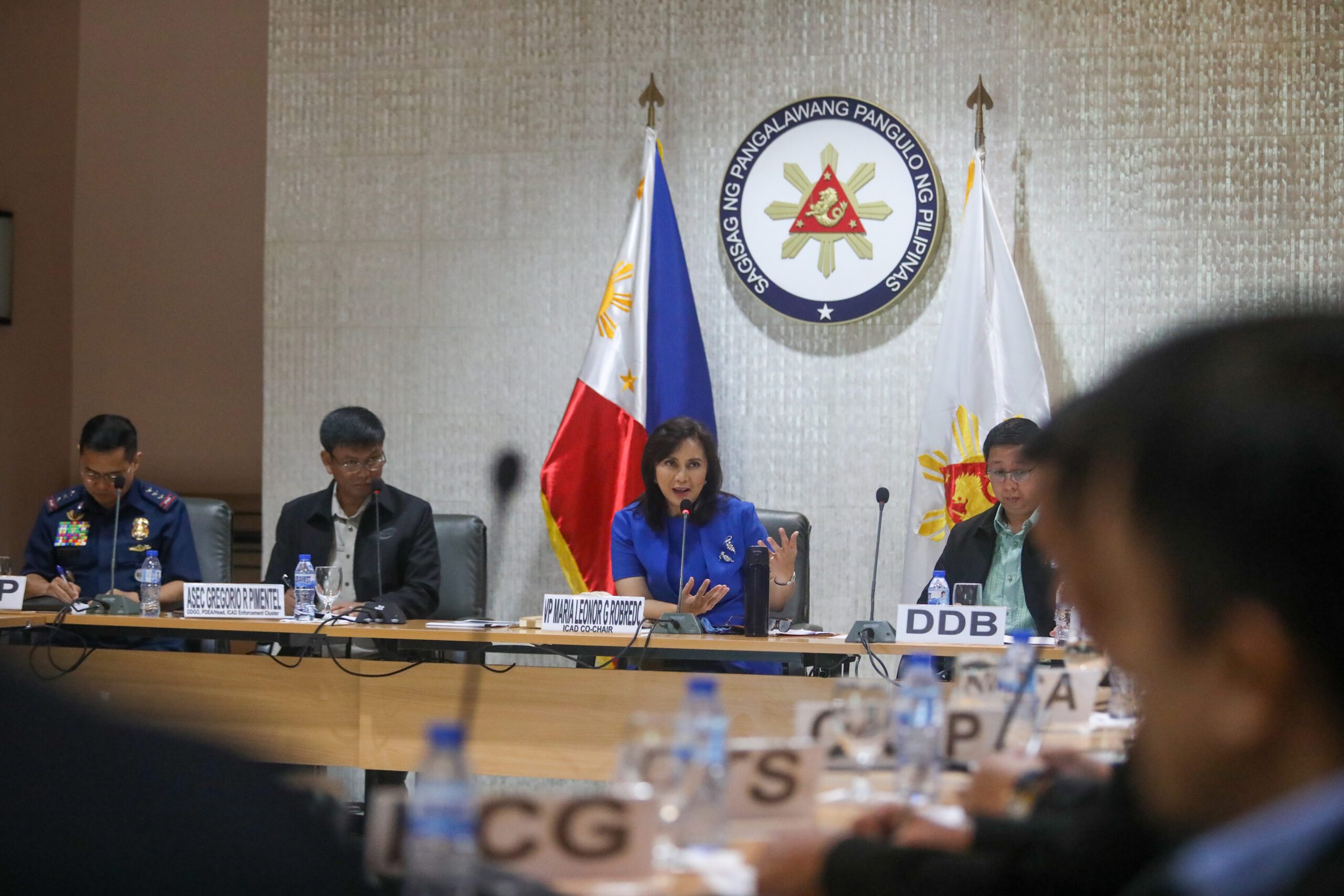SUMMARY
This is AI generated summarization, which may have errors. For context, always refer to the full article.

MANILA, Philippines – Vice President Leni Robredo on Thursday, November 14, gave her first directive to law enforcement agencies: Complete the government’s baseline data on the extent of the illegal drugs problem in the country
Robredo, as co-chairperson of the Inter-Agency Committee on Anti-Illegal Drugs (ICAD), met with the member agencies of the body’s law enforcement cluster and gave them until the end of the year to collate the data. (READ: Robredo: ‘Mother’s instinct’ made me accept anti-drugs post)
“Ang unang na-highlight is as of now, walang clear baselines. So ‘yon ‘yong pinagtatrabahuhan…. Napakahalaga no’n kasi ‘yun ‘yung kailangan para masukat ‘yong accomplishment…para mag-set ng metrics. ‘Yun ‘yung kailangan para makita kung naging effective ba ‘yung mga means na in-e-employ,” the Vice President said in an ambush interview after the meeting.
(The first thing highlighted during the meeting was that, as of now, there are no clear baselines. So that’s what we are going to work on…. That’s important because that’s what you need to measure the accomplishments…to set metrics. That’s what you need to check if the means you are employing are effective.)
“’Yung aming target, until the end of the year mayroon nang linaw (Our target is to have the clear data by end of the year),” she added.
Among the data the ICAD co-chair wants to see are exact figures on the number of drug users and pushers who were arrested since 2016, how many have surrendered to authorities, the status of their respective cases, and recommendations and the status of their rehabilitation.
The Vice President, however, acknowledged it is difficult to complete this information, even if President Rodrigo Duterte has been waging his bloody war on drugs for over 3 years now. (READ: 5 fatal obstacles in Robredo’s target of a deathless drug war)
She said different agencies, like the Philippine Drug Enforcement Agency (PDEA), the Philippine National Police (PNP), and the Department of the Interior and Local Government (DILG), down to the local government units, have their respective drug lists.
DILG Undersecretary Ricojudge Echiverri, who was at the ICAD cluster meeting, also said local politics get in the way of data collection. (READ: DILG’s new anti-drug info system excludes data on killings)
“Like for example, hindi maiiwasan ‘yung mga barangay, imbes na ang ibigay na listahan ‘yung mga totoo, ‘yung ilalagay nila sa listahan ‘yung mga kalaban nila sa pulitika. So ive-vet pa ‘yun ng mga PNP at PDEA,” said Echiverri.
(Like for example, you cannot avoid situations in the barangay wherein offiicals would put in names of their politial rivals in the list. So PNP and PDEA still need to vet those.)
No finger-pointing
Robredo, however, does not want to pin the blame on anybody for now.
“Pero ‘yung sa akin, na parating moving forward. Wala na tayong masyadong oras. Parati ko ‘tong inuulit: two and a half years na lang. Kailangan tayong maghabol,” said the Vice President.
(But for me, it should always be moving forward. We don’t have much time on our hands. I always say this: we only have two and a half years left. We need to double time.)
The Vice President plans to meet separately with officials from the DILG, the Dangerous Drugs Board, and the Department of Health next week as she pushes for a community-based rehablitation approach in the anti-illegal drugs campaign of the Duterte administration. (READ: Robredo opens ICAD meet: The enemy is drugs, not people)
On Wednesday, November 13, the ICAD co-chair met with officials from the United States government, which expressed its “full support” to help the Philippines fight drugs. – Rappler.com
Add a comment
How does this make you feel?
There are no comments yet. Add your comment to start the conversation.